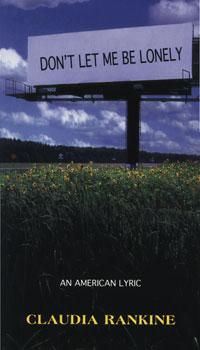As a literary genre still fighting for ironic legitimacy, prose poetry received a Hail Mary the length of Doug Flutie’s 1986 game-winning touchdown pass when Claudia Rankine published Don’t Let Me Be Lonely: An American Lyric with Graywolf Press.
Irony stems from the fact that L=A=N=G=U=A=G=E / prose poetry authors who now seek legitimacy for their work, once railed against the rigidity and creative bankruptcy of a standardized academia which by its nature stultifies creativity and the free expression of poetry. A system which employs many of said poets now, and through which many publish their work. Not since I first discovered Carolyn Forché’s “The Colonel” have a felt that I understood exactly what “real” or “good” prose poetry is, or could become, until reading Don’t Let Me Be Lonely.
Some authorities debate whether “prose poetry” even exists as its own legitimate form, i.e., with structural guidelines and conventions. Reading prose poems by Hejinian, Forché, and Rankine, however, provide such a working definition. Prose poetry: a) is poetry without-or uses a deliberate minimum of-line breaks, b) uses prosaic language, often including full sentences as well as sentence fragments, c) relies as much or more on vivid imagery as narrative, i.e., traditional prose devices such as plot and character development are sublimated to the elevated, imagistic language of poetry, and d) appears without the traditional sequence, while imitating the form of narrative prose.
The difficult thing about prose poetry is that it straddles the fence between poetry and prose, pushing the defined boundaries of both, e.g., flash fiction, James Joyce, and Baudelaire. Even contemporary fiction-memoir master James Frey stole a stylistic note from prose poetry.
Unlike other prose poetry-including Lyn Hejinian’s seminal “My Life”, which would have better served its stated purpose if broken into traditional poetic lines-Don’t Let Me Be Lonely needs its mixed-genre prose poem form to provide an anchor for the emotional and political depths that Rankine’s writing achieves. Far too many people are compelled to place creative or experimental work in one category or the other, but prose poetry by its nature defies such categorization. Don’t Let Me Be Lonely is no exception in this regard. The book uses a mixed-genre style that will likely remain a lasting legacy for future poets. Rankine’s long been known for experimental multi-genre writing. She seamlessly blends poetic lyrics, essay-writing, and television stills in this politically charged masterpiece. The prose form allows her to create a tumbling, strangely open narrative that is unified and diverse at once. The poetry component of the form allows vivid imagery and a flu-dity/adaptability of common usage English not available to traditional prose writing. Rankine flows organically, intuitively between the images and different writing styles.
Reading Don’t Let Me Be Lonely is like watching someone throw metaphoric carbonic acid onto a Maya Angelou or Zora Neale Huston novel: the traditional form of prose has dissolved into an imagistic stream of consciousness, which reflects the narrator’s dissolving sense of self.
Writing as an introduction for Ms. Rankine at a 2005 reading at the Pratt Institute, A.L.McFadden noted that “in a lot of ways, Don’t Let Me Be Lonely reads like an autobiography, but if anything, it’s the autobiography of American culture and not just Rankine herself.” Her, and by inference America’s, self-dissolution comes arrives as a result of the constant barrage of bad news, racism, and misleading rhetoric by “uncaring, elitist politicians,” combined with a growing isolation particularly afflicting urban poor/working class single persons. The book’s moral and socio-political criticism is as relentless as its language is personal and touching:
“I don’t know, I just find when the news comes on I switch the channel. This new tendency might be indicative of a deepening personality flaw: IMH, The Inability to Maintain Hope, which translates into no innate trust in the supreme laws that govern us. Cornel West says this is what is wrong with black people today-too nihilistic. Too scarred by hope to hope, too experienced to experience, too close to dead is what I think.”
Anyone who’s been suicidal could write with the same pen as Rankine as she describes calling 1-800-SUICIDE in a moment of desperation:
“You explain to the ambulance attendant that you had a momentary lapse of happily. The noun, happiness, is a static state of some Platonic ideal you know better than to pursue. Your modifying process had happily or unhappily experienced a momentary pause. This kind of thing happens, perhaps is still happening.”
Even those who have not cannot deny the power of her words and images. A Jamaican-American, Rankine’s a storyteller in the old-fashioned sense in that her narrative is no more important than images such as “She was the kind of woman who liked to shrug; deep within her was an everlasting shrug. That didn’t seem like a death.” As I read the piece, I picture Rankine sitting in her dining room speaking the story of “Don’t Let Me Be Lonely” to a group of her grandchildren. If I were one, I’d listen to it over and over.
Rankine’s passages are frightfully alive; her cadence gorgeous. The words leap off the page into my mouth, pulling on my tongue until I speak them aloud. She seems a natural heir to the powerful African-American/Caribbean oral traditions, a kind of pre-history that can be traced back through ancestry, culture, and lineage to the beginnings of human civilization. The same spoken traditions that have given rise to modern cultural achievements such as the Black Arts literary movement, the Blues, Hip-Hop and Rap, Gospel/Soul, and Jazz, are hard at work in Claudia Rankine’s pioneering voice.





















































